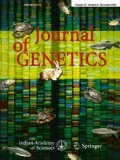Abstract
Autosomal recessive primary microcephaly is a rare genetic disorder that is characterized by reduced head circumference and a varying degree of intellectual disability. Genetic studies on consanguineous families with primary microcephaly have identified 15 (MCPH) causative genes that include MCPH1, WDR62, CDK5RAP2, CASC5, ASPM, CENPJ, STIL, CEP135, CEP152, ZNF335, PHC1, CDK6, CENPE, SASS6 MFSD2A ANKLE2 and CIT (Khan et al. 2014; Yamamoto et al. 2014; Alakbarzade et al. 2015; Morris-Rosendahl and Kaindl 2015; Basit et al. 2016). Physiologically, most of these MCPH proteins are involved in cell cycle and its regulation. In the present clinical genetic study, we have present two consanguineous Pakistani families segregating primary microcephaly and intellectual disability. These families were ascertained from the Saraiki ethnic part of Khyber-Pakhtunkhwa province in Pakistan. Whole exome sequencing in one family revealed a novel 1-bp deletion NM_018136.4: c.10013delA (p.Asp3338Valfs*2), while the other family showed a previously reported nonsense mutation NM_018136.4: c.9730C > T (rs199422195 (p.Arg3244*)) in ASPM gene. The novel frame-shift mutation (p.Asp3338Valfs*2) in ASPM presumably truncates the protein synthesis that results in loss of armadillo-type fold domain.

References
Alakbarzade V., Hameed A., Quek D. Q. Y., Chioza B. A., Baple E. L., Cazenave-Gassiot A. et al. 2015 A partially inactivating mutation in the sodium-dependent lysophosphatidylcholine transporter MFSD2A causes a non-lethal microcephaly syndrome. Nat. Genet. 47, 814–817.
Barbelanne M. and Tsang W. Y. 2014 Molecular and cellular basis of autosomal recessive primary microcephaly. Biomed. Res. Int. 2014, 547986.
Basit S., Al-Harbi K. M., Alhijje S. A. M., Albalaure A. M., Alharby E., Eldardear A. et al. 2016 CIT, a gene involved in neurogenic cytokinesis, is mutated in human primary microcephaly. Hum. Genet. 135, 1199–1207.
Baudier J., Deloulme J. C., Van Dorsselaer A., Black D. and Matthes H. W. 1991 Purification and characterization of a brain specific protein kinase C substrate, neurogranin (p17). Identification of a consensus amino acid sequence between neurogranin and neuromodulin (GAP43) that corresponds to the protein kinase C phosphorylation site and the calmodulin-binding domain. J. Biol. Chem. 266, 229–237.
Bramham J., Hodgkinson J. L., Smith B. O., Uhrín D., Barlow P. N. and Winder S. J. 2002 Solution structure of the calponin CH domain and fitting to the 3D-helical reconstruction o F-actin: calponin. Structure 10, 249–258.
Coates J. C. 2003 Armadillo repeat proteins: beyond the animal kingdom. Trends. Cell. Biol. 13, 463–471.
do Carmo Avides M. and Glover D. M. 1999 Abnormal spindle protein, Asp, and the integrity of mitotic centrosomal microtubule organizing centers. Science 283, 1733–1735.
Gul A., Tariq M., Khan M. N., Hassan M. J., Ali G. and Ahmad W. 2007 Novel protein-truncating mutations in the ASPM gene in families with autosomal recessive primary microcephaly. J. Neurogenet. 21, 153–163.
Huber A. H., Nelson W. J. and Weis W. I. 1997 Three-dimensional structure of the armadillo repeat region of beta-catenin. Cell 90, 871–882.
Kamphans T. and Krawitz P. M. 2012 GeneTalk: an expert exchange platform for assessing rare sequence variants in personal genomes. Bioinformatics 28, 2515–2516.
Khan M. A., Rupp V. M., Orpinell M., Hussain M. S., Altmuller J., Steinmetz M. O. et al. 2014 A missense mutation in the PISA domain of HsSAS-6 causes autosomal recessive primary microcephaly in a large consanguineous Pakistani family. Hum. Mol. Genet. 23, 5940–5949.
Leipe D. D., Koonin E. V. and Aravind L. 2004 STAND, a class of P-loop NTPases including animal and plant regulators of programmed cell death: multiple, complex domain architectures, unusual phyletic patterns, and evolution by horizontal gene transfer. J. Mol. Biol. 343, 1–28.
Mahmood S., Ahmad W. and Hassan M. J. 2011 Autosomal recessive primary microcephaly (MCPH): clinical manifestations, genetic heterogeneity and mutation continuum. Orphanet. J. Rare. Dis. 6, 39.
Morris-Rosendahl D. J. and Kaindl A. M. 2015 What next-generation sequencing (NGS) technology has enabled us to learn about primary autosomal recessive microcephaly (MCPH). Mol. Cell. Probes 29, 271–281.
Nicholas A. K., Swanson E. A., Cox J. J., Karbani G., Malik S., Springell K. et al. 2009 The molecular landscape of ASPM mutations in primary microcephaly. J. Med. Genet. 46, 249–253.
Robinson P. N., Köhler S., Oellrich A., Wang K., Mungall C. J. et al. 2014 Sanger Mouse Genetics Project, Improved exome prioritization of disease genes through cross-species phenotype comparison. Genome Res. 24, 340–348.
Smedley D., Köhler S., Czeschik J. C., Amberger J., Bocchini C., Hamosh A. et al. 2014 Walking the interactome for candidate prioritization in exome sequencing studies of Mendelian diseases. Bioinformatics 30, 3215–3222.
Woods C. G., Bond J. and Enard W. 2005 Autosomal recessive primary microcephaly (MCPH): a review of clinical, molecular, and evolutionary findings. Am. J. Hum. Genet. 76, 717–728.
Yamamoto S., Jaiswal M., Chang W. -L., Gambin T., Karaca E., Mirzaa G. et al. 2014 A Drosophila genetic resource of mutats to study mechanism underlying human genetic diseases. Cell 159, 200–214.
Zemojtel T., Köhler S., Mackenroth L., Jäger M., Hecht J., Krawitz P. et al. 2014 Effective diagnosis of genetic disease by computational phenotype analysis of the disease-associated genome. Sci. Transl. Med. 6, 252ra123.
Acknowledgements
We extend special thanks to all family members for their volunteer participation in this study. The current study is partially supported by startup research grant from Higher Education Commission of Pakistan (M-IPFP/HRD/HEC/2011/346) for molecular screening of neurological disorders. MAK appreciates the valuable contribution of his beloved nephew, Abdul Ahad Khan Gandapur in recruiting the family.
Author information
Authors and Affiliations
Corresponding author
Additional information
Corresponding editor: S. Ganesh
[Khan M. A., Windpassinger C., Ali M. Z., Zubair M., Gul H., Abbas S., Khan S., Badar M., Mohammad R. M. and Nawaz Z. 2017 Molecular genetic analysis of consanguineous families with primary microcephaly identified pathogenic variants in the ASPM gene. J. Genet. 96, xx–xx]
Rights and permissions
About this article
Cite this article
KHAN, M.A., WINDPASSINGER, C., ALI, M.Z. et al. Molecular genetic analysis of consanguineous families with primary microcephaly identified pathogenic variants in the ASPM gene. J Genet 96, 383–387 (2017). https://doi.org/10.1007/s12041-017-0759-x
Received:
Revised:
Accepted:
Published:
Issue Date:
DOI: https://doi.org/10.1007/s12041-017-0759-x

